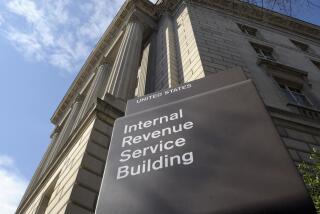It’s Not Too Soon to Think About Income Taxes
- Share via
By now many individuals have packed away their tax forms with the expectation that they won’t have to think about the Internal Revenue Service for nearly another year.
Think again.
Although it is possible to deal with taxes at the last minute, those who start planning now can often save substantial amounts on their year-end tax bills.
These months following the April 15 filing deadline are generally slow days for your local tax accountant. It could behoove you to take advantage of that time to make an appointment and talk about how you might improve your tax situation next year.
There is very little magic to tax planning in these post-reform days. There are still a few sexy tax shelters. But in many cases they only provide investors with a way to spend a dollar to save 28 cents--hard to argue for.
Instead, depending on the individual situation, the accountant might recommend such investments as municipal bonds, tax-favored retirement plans or college savings bonds.
The accountant might also suggest simple changes in the customer’s budget that make both financial and tax sense.
For instance, those who owe money on credit cards should pay them off as soon as possible. The interest paid on credit card debts is no longer deductible, which makes those 19% and 20% rates all the more expensive.
One other important, but often overlooked, way to save on taxes would be to start a good record-keeping system, said R. Michael Shaw, partner at the accounting firm Coopers & Lybrand.
Accountants maintain that many individuals simply forget about hundreds of dollars in allowable deductions--the amount they put in the collection plate at church, clothing that was given to charity, unreimbursed medical and business expenses.
It is possible that a standard deduction will amount to more than your itemized deductions, but you will never know until you keep track.
And once individuals start watching, they are often surprised at how much they have in deductible expenses each year, Shaw said.
What kind of records do you need to keep?
The taxes you pay to state and local governments are usually deductible on your federal return. In addition to records regarding your basic state income taxes, you need details about any property taxes paid, personal property taxes--most of the the registration fee you pay to the Department of Motor Vehicles, for instance--and other special taxes, such as school and water district taxes.
Interest expense should also be noted. For most people home mortgage interest will be the biggest item. Consumers no longer need keep track of the interest they pay on cars, boats and credit cards because these amounts are no longer deductible.
Charitable contributions: In many cases, your records will be the only documentation that you’ll have for cash and goods given to charity. When you give cash, be sure to get a receipt. When you give clothing or other personal items, you should also get some sort of acknowledgement from the charity. And if these items are of great value--more than $500--you will need additional documentation. If the value exceeds $5,000, you will need a qualified appraisal. The value of donated time is not deductible.
But you can deduct an amount for mileage when you drive a great deal for charitable work, as well as other out-of-pocket expenses, such as parking.
Medical expenses are only deductible to the extent that they exceed 7.5% of your adjusted gross income. Deductible expenses would include the unreimbursed portion of doctors’ and dentists’ bills, as well as health insurance payments.
Two-income families can also claim a tax credit for child care if they have records indicating how much they pay and if their child-care provider has a tax identification number. If the child-care provider is an individual, a Social Security number is sufficient.
Some unreimbursed business expenses are also deductible. However, restrictions on what can be deducted for those who have home offices have received increased scrutiny by the IRS.
Those who plan to write off such expenses should be aware of these rules and be wary. The IRS can impose hefty penalties on those it thinks are cheating. And, typically, if you use your home office for anything other than work, they will disallow the deduction.
However, the unreimbursed amount you pay to attend business seminars and buy publications essential to your work are generally deductible, subject to a 2% floor. Professional dues and work-related moving expenses can also sometimes be deducted.
Notably, too, you can deduct the amount you pay to your tax accountant for preparing your return and helping you with tax planning.
Also, if you plan to write off your car for business, you need to keep track of work-related mileage. Although a daily log is not required, the more evidence you have the better off you are in an audit. It is also important to note that the miles you drive to and from work are not deductible.
More to Read
Inside the business of entertainment
The Wide Shot brings you news, analysis and insights on everything from streaming wars to production — and what it all means for the future.
You may occasionally receive promotional content from the Los Angeles Times.










